I appreciate this opportunity to share and reflect on my experience as a Fulbright U.S. Senior Scholar-Teacher in Taiwan at National Central University, hosted by the Department of English, and affiliated with their Center for the Study of Sexualities. Fulbright has helped me to fully immerse myself in Taiwan’s academic research, film festival, and activist cultures and I am so grateful for the networks I have been able to build thanks to the program. Established in 1995, NCU’s Center for the Study of Sexualities (中央大學性/別研究室) is an interdisciplinary effort which actively recruits research fellows who focus on “stigma and sexualities at the margins” including sex worker rights.
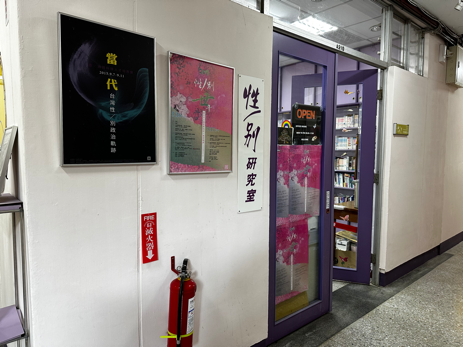
I have been researching and writing my fourth book, tentatively titled Inter-Asia Network Films and Cosmopolitan Sex Workers, about the 21st century phenomenon of network narrative films featuring several characters with intertwining fates. I am specifically looking at films about inter-Asia networks of migration and travel, and migrant sex workers as figures of globalization and cosmopolitanism “from below” (rather than exclusively associated with the travel of global elites).
I recently published a book on Taiwan-based Malaysian filmmaker Tsai Ming-liang (蔡明亮), Cruisy, Sleepy, Melancholy: Sexual Disorientation in the Films of Tsai Ming-liang (2022), and his diasporic, tourist, and otherwise displaced characters’ experiences of space, spatial practices, and sexuality in Taiwan, Malaysia, Japan, and France. I am now interested in following Tsai’s “post-retirement” work (after he announced his retirement from commercial feature filmmaking) and following his actors beyond his body of work. I have been researching Tsai’s 2020 film Days (日子) set in Taiwan, Hong Kong, and Thailand, Tsai’s lead actress Chen Shiang-chyi ((陳湘琪) in Jenny Lu’s film The Receptionist (接線員, 2016) about diasporic Chinese and Taiwanese women working in the UK, and Tsai’s male muse actor Lee Kang-sheng (李康生) in Lim Kah Wai’s film Come and Go (2020), which depicts multiple Asian migrant stories in Osaka, Japan.
I integrated these films into my courses at NCU: a graduate seminar “Interdisciplinary Studies: World Cinema and the Cross-Cultural Encounter” and spring 2024 undergraduate course “Introduction to Gender/Sexuality Studies: Gender, Sexuality, and Cinema.” I have learned so much from the students’ perspectives on inter-Asia travel and migration, cross-cultural communication, and the rights of gender and sexual minorities. My research and teaching focus on often-stigmatized groups—like migrant workers, including sex workers—and I hope that teaching media literacy and critical thinking about complex stories about migration, gender, and sexuality can help challenge stereotypes and dominant but oversimplified narratives like those that conflate sex work with “trafficking.” The cultural exchange with my students and colleagues at NCU has been so valuable and has truly felt like a two-way learning experience that has pushed my research and teaching in productive new directions. I have found people in Taiwan to be open-minded and committed to gender equality, freedom of expression, and the human rights of sexual minorities. I also participated in NCU’s “Critical Anglophone Studies” speaker series and offered a publishing workshop for faculty.
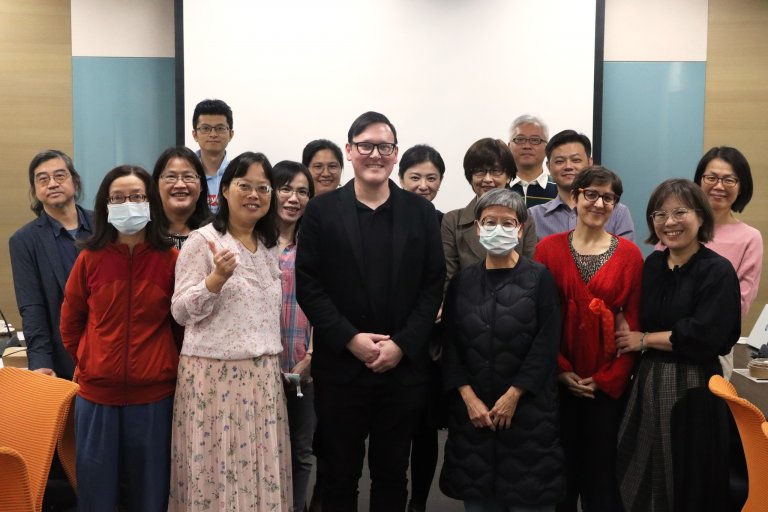
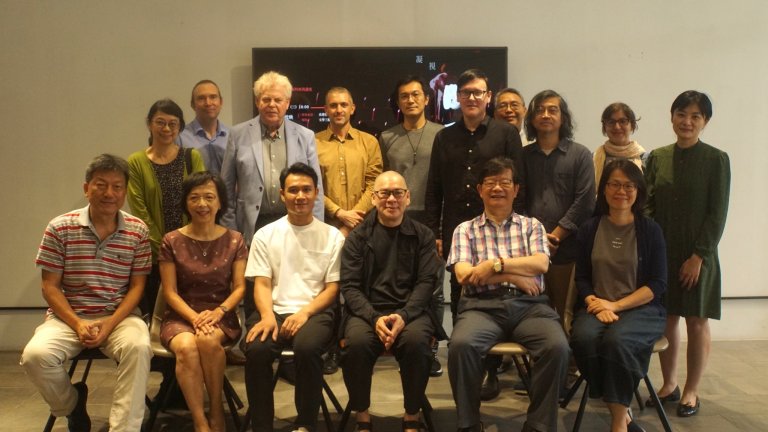
It was a joy to be able to welcome Tsai Ming-liang to NCU campus along with my colleagues in Visual Studies, Chinese Literature, English, and French, and to personally hand him a copy of my book on his films. Even with his prestigious international reputation as the first filmmaker ever commissioned to make a film for the permanent collection of the Louvre Museum, and lauded at international film festivals, I have been so impressed by Tsai’s accessibility and desire to reach out to new audiences, often selling tickets on the street to college students, knowing that his work is not like other more commercial fare at the cineplex.
I was very fortunate that my time in Taiwan corresponded with a major exhibition at the Museum of National Taipei University of Education (MoNTUE) “Tsai Ming-liang’s Days” featuring public lectures by Tsai experts and Tsai himself showing the process that went into making the film and some other rare films I would not have been able to see if I were not here in person. Some of the talks pushed the limits of my Mandarin listening comprehension, but I found that throwing myself in the “deep end” of Chinese with good context clues worked to increase my vocabulary and listening skill level.
The MoNTUE exhibition also included unusual special events like a cooking demonstration by Tsai and Anong (who stars in Days), and an intimate listening session with Tsai playing his favorite old Mandarin pop songs. He is known for incorporating these nostalgic songs into his films, such as his now truly uncanny pandemic disaster film/musical The Hole (洞, 1998) and his cinephile ode to a closing old Taipei movie theater Goodbye, Dragon Inn (不散, 2003). I was able to visit the Xining Public Housing (西寧國宅) where Tsai first filmed The Hole and watch his newly commissioned digital film honoring the historical memory of the building and its inhabitants for the Walking in Wanhua multi-site exhibition and walking tour.
With my NCU colleague Jonathan Yeh (葉德宣) I was also able to interview Chen Shiang-chyi about her work with Tsai and acting in The Receptionist. She provided crucial insights on Taiwanese diaspora that I have incorporated into my research and scholarship. Before I return to the U.S. I will travel to Japan to interview director Lim Kah Wai about Come and Go.
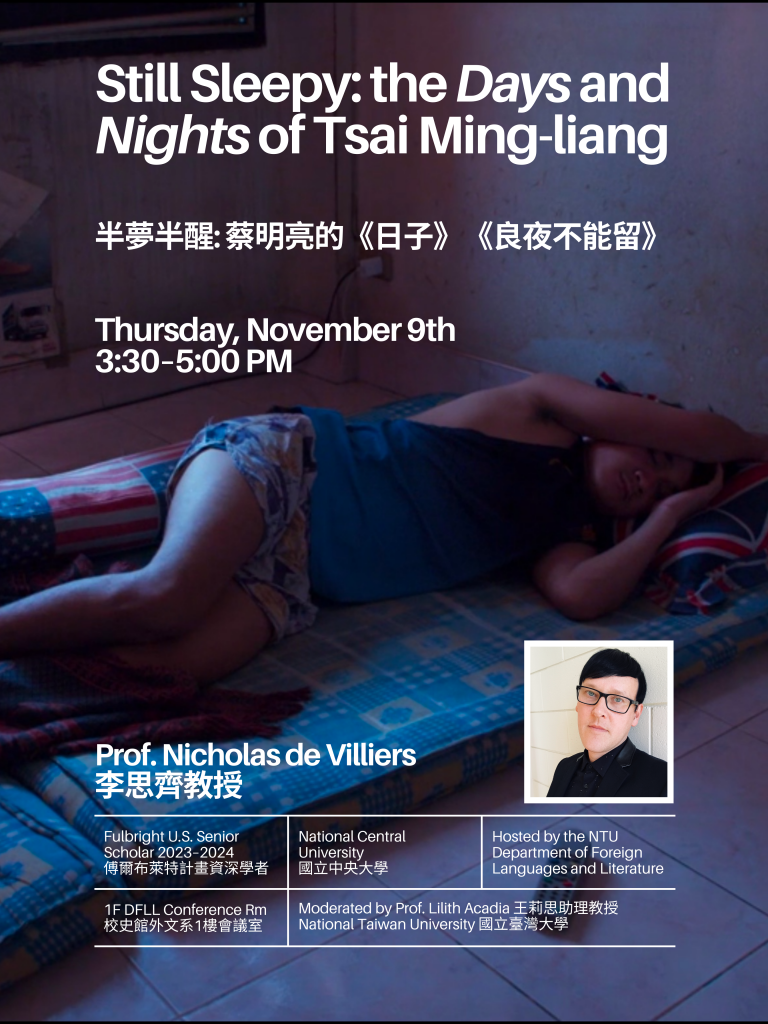
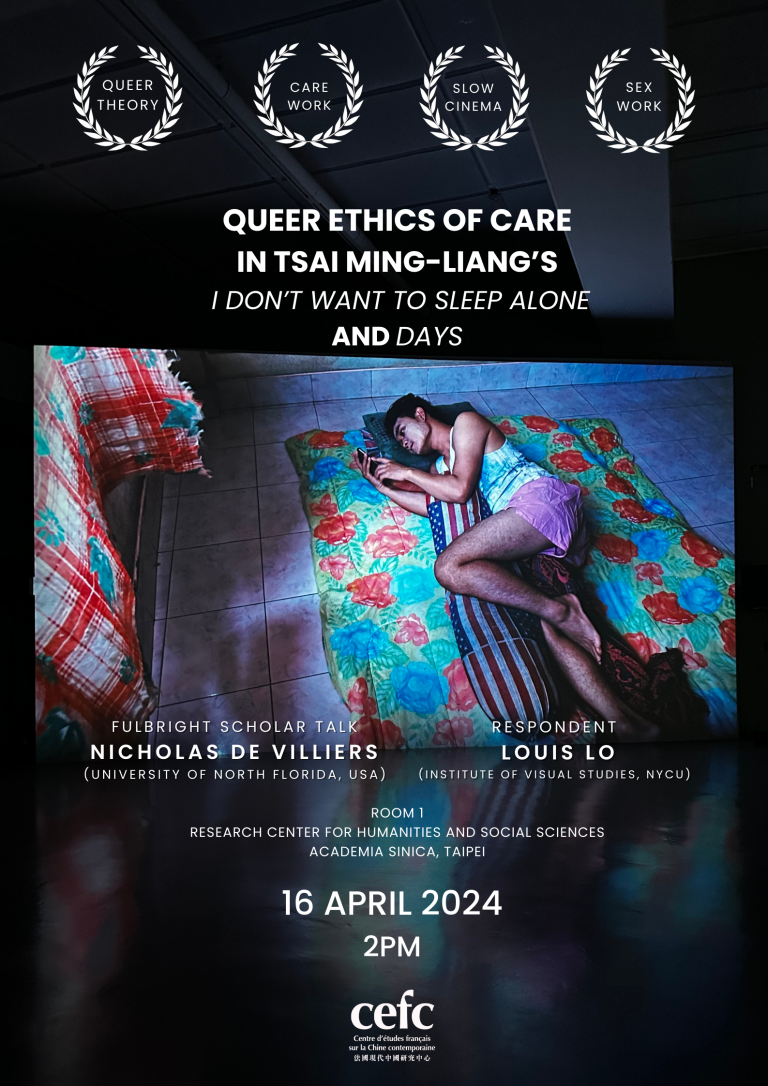
Fulbright has helped me to expand my network in Taiwan and globally, sharing my research in public talks at National Taiwan University and Academia Sinica and five academic conferences. I have also given invited talks in Aotearoa-New Zealand at the University of Otago and Thailand at Mahidol University International College, thanks to invitations from academics I met at conferences in Taiwan (Dr. Paola Voci and Dr. Kevin Hart), and the support of Fulbright-AMINEF East Asia and Pacific regional travel grants. In Bangkok, I got to visit the filming locations of Tsai’s Days as part of the place-based research methods I have developed.
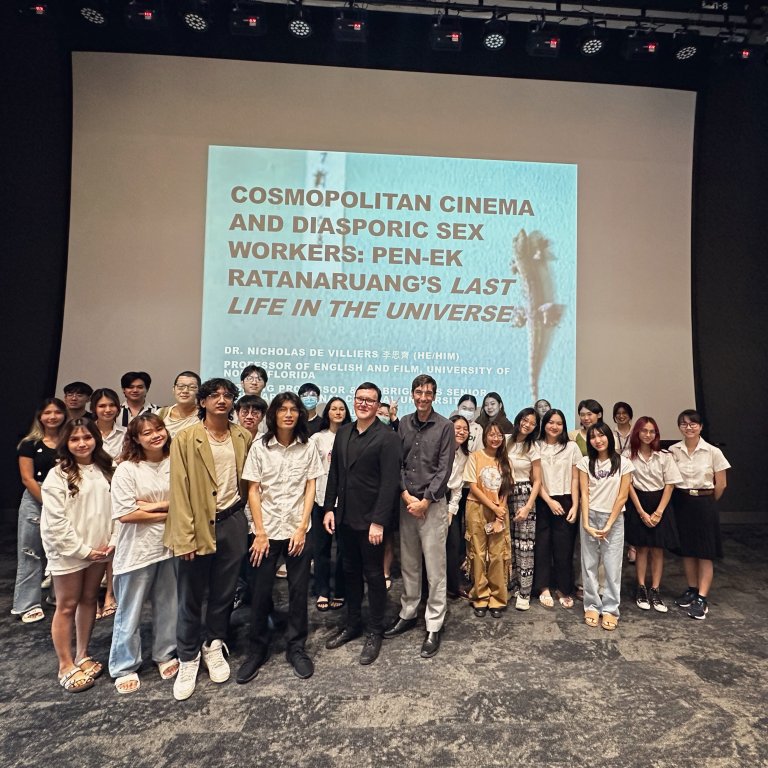
I was also thrilled to participate in the Taiwan International Queer Film Festival (this year’s theme: “Roots and Routes: Queering Diversity”), several brilliantly curated film series at the Taiwan Film and Audiovisual Institute, and the Taipei Golden Horse Film Festival. In the latter, I was able to see the debut of Tsai’s latest film in his Walker series and the debut of Future Shock: The End of Eternity (2023) by Su Hui-yu starring Popcorn, a drag performer in Taipei whom I invited along with drag king Pretty Hairy to a student-led Q&A in my Gender, Sexuality, and Cinema course at NCU.
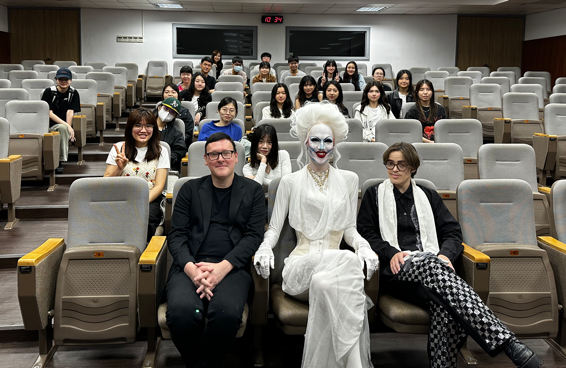
It has been gratifying to watch the super talented Taiwanese drag queen Nymphia Wind (妮妃雅瘋) become the first East Asian queen to win RuPaul’s Drag Race (a television program I have researched and published on). Seeing Nymphia return to Taiwan to celebrate her victory and be invited to perform for outgoing President Tsai Ing-wen (蔡英文) at the Presidential Office was fascinating. Nymphia later joined the crowd in pro-democracy demonstrations in Taipei. In some ways, witnessing and sharing these experiences has felt like living in a parallel universe from my ordinary situation as an American based in the state of Florida where drag performers, protests, and higher education have all been made targets of censorship in a culture war (see reports by the American Civil Liberties Union [ACLU] and the American Association of University Professors [AAUP]). At the same time, I have tried to spend my time in Taiwan listening to local concerns and struggles: demonstrations for migrant workers’ rights and against exploitative broker systems; for transgender rights and representation; over priorities and metrics in higher education; and ways to protect and defend Taiwan’s democratic values and institutions.
My experience as a researcher and teacher in Taiwan has involved studying and discussing films that directly address the important value—but also the difficulties and tribulations—of cross-cultural communication and gender and sexual diversity. Fulbright’s dedication to cross-cultural understanding is urgently needed, especially at this time of revived culture wars. I plan to sustain the networks, cooperation, and practices of care and support I experienced as part of my time at NCU and thanks to Fulbright Taiwan. These experiences will enrich my research, publications, and the courses I teach when I return to my home institution, the University of North Florida. I am also working on developing a study abroad program in Taiwan for UNF students.
I am grateful for the support of a sabbatical leave from the University of North Florida, the Fulbright Taiwan research-teaching grant and helpful staff, Fulbright-AMINEF East Asia and Pacific regional travel grants, and my hosts at National Central University’s Department of English and Center for the Study of Sexualities. Many thanks to my Mandarin language tutor at NCU, Alina Huang. I am also grateful for invitations to present my research in Taiwan at National Yang Ming Chiao Tung University, National Central University, National Taiwan University, National Penghu University, National Chengchi University, Academia Sinica, in Aotearoa-New Zealand at the University of Otago, and in Thailand at Mahidol University International College.





